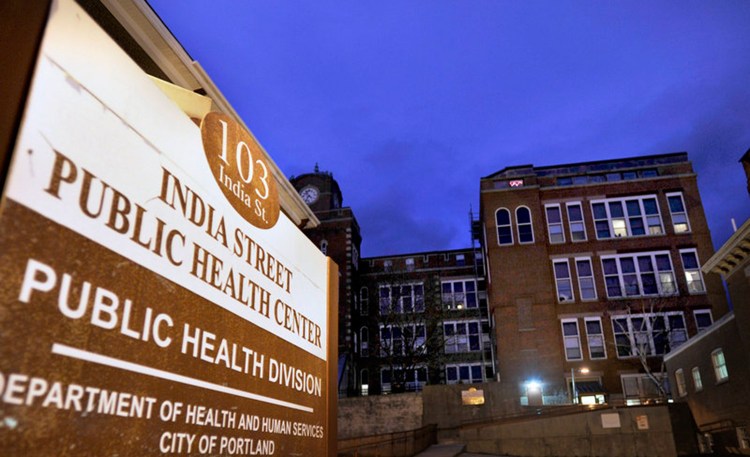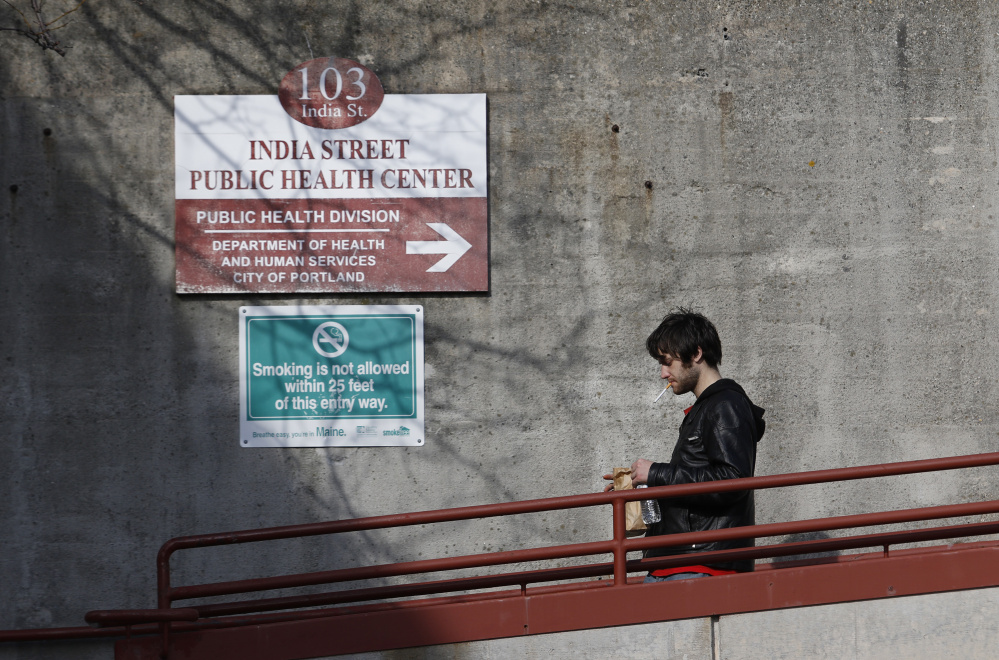Portland’s city manager is proposing to close a city-run health clinic and make other significant changes to the city’s Health and Human Services Department as part of an annual municipal budget to be presented Monday.
Patients at the city’s India Street Public Health Center would be moved to the nonprofit Portland Community Health Center on Park Avenue, which will take on the city’s needle exchange program and other services being provided at the India Street clinic.
Some of the proposals are the result of an anticipated loss of public health grant funding from the state, while other changes represent a shift in city priorities.
City Manager Jon Jennings said cities across the country are moving away from providing certain types of health-related services and toward partnering with private groups.
“Some of this is going to have to elicit a community conversation on the types of services we provide,” Jennings said. “We’re never going to be able to do everything for everybody.”
Although details of the budget for the fiscal year beginning July 1 will not be made public until Monday, Jennings provided a general overview to the Portland Press Herald. City councilors also were apprised of the budget and they expect community resistance to some of the proposals, which also include reorganizing several departments.
“This is just the beginning of a very long and tedious process, but I like the way (Jennings) is setting the stage for this conversation,” City Councilor Jill Duson said. “People have several steps in the process when they can give their reactions to an item.”
Councilors applauded Jennings’ desire to focus on core government services, such as paving roads and maintaining sidewalks.
“I think that’s important for the public to know their tax dollars are being spent wisely,” City Councilor David Brenerman said. “I think streets and sidewalks are things that are tangible and people appreciate when they see the condition of the city improved.”
Jennings’ $235.9 million municipal budget proposal is nearly $11 million more than last year, a roughly 5 percent increase. The budget contains a property tax increase despite a development boom that has added more than $68 million to the city’s overall property valuation and is estimated to bring in an additional $1.4 million in tax dollars each year.
When combined with the proposed school budget of $103.6 million, the overall city budget would increase property taxes by 2.3 percent, bringing the tax rate up to $21.10 per $1,000 of assessed value from $20.63 per $1,000. That would result in a $141 property tax increase on a home with an assessed value of $300,000.
Tax increases in each of the last three years have ranged from 3 percent to 3.1 percent.
The council is expected to formally receive the budget Monday and refer the proposal to its Finance Committee, which will begin its budget review on Wednesday.
Although several councilors agreed with the direction of the budget, some raised concerns about the tax increase.
“The council as a whole set an upper limit in our goal-setting of 2.5 percent,” City Councilor Edward Suslovic said. “I would like to see it a little less than that.”
City staffers were finalizing the proposed budget on Friday, and details such as specific staffing changes weren’t available. However, City Finance Director Brendan O’Connell said in an interview Thursday that there could be a net loss of about 13 full-time equivalent positions, with around 50 jobs being eliminated and another 30 to 40 being created.
O’Connell said the city is facing a 14 percent increase in health care costs, adding $2 million to the budget. City employees also are getting a 2 percent cost-of-living raise, and the city’s new minimum wage law has added nearly $50,000 to the budget.
INDIA STREET CLINIC MAY CLOSE
Perhaps the biggest change in the budget proposal is the closure of the India Street Public Health Center, which provides free health services to low-income residents.
The India Street clinic has an annual budget of $1.4 million, including $450,000 in city funding. The rest of the funding comes from grants and insurance reimbursements. From 2014 to 2015, 230 patients received HIV-positive health care, while 1,405 people were tested for HIV and other sexually transmitted diseases, according to the most recent annual report. The needle exchange program served 808 enrollees, including 316 new individuals, collecting and redistributing more than 140,000 needles.
Patients of the clinic will be transitioned to the Portland Community Health Center on Park Avenue, where Jennings said the same services will be available.
Jennings said the decision was made because the Portland Community Health Center is a federally qualified health clinic, making it eligible for higher reimbursement rates. It also has the ability to maintain electronic health records, while the city does not.
Suslovic, who chairs the council’s Health and Human Services Committee, supports the move, saying it was similar to the city’s decision last year to close the Healthcare for Homeless Clinic on Portland Street, transitioning those patients to the Portland Community Health Center.
“They’re in a much better position to draw down additional funding,” Suslovic said of the Park Avenue clinic. “No one is saying these are not important services and no one is saying these services shouldn’t be provided.”
Staff at the India Street clinic referred a reporter to City Hall when asked to comment on the closure. City Hall Communications Director Jessica Grondin declined to make anyone from the clinic available for an interview, instead offering an interview with an administration official.
Grondin said the closure would eliminate 13.5 full-time equivalent employees.
The Portland Community Free Clinic, a separate nonprofit, also operates out of the India Street clinic. It’s unclear how the closure will affect it, but funding has been an issue for the nonprofit since Mercy Hospital pulled a $210,000 grant in 2012.
Jennings said his budget also would transfer management of the school-based health clinics to the Portland Community Health Center by July 1, while the school-based dental clinics would be transitioned at the end of the next fiscal year. Both clinics would continue to operate as normal, he said.
LOSING STATE GRANT MEANS LAYOFFS
Meanwhile, public health staff who focus on disease prevention could be subject to layoffs because of the loss of state grants. City officials couldn’t provide information this week about the value of the state grants being lost or how many people would lose their jobs as a result.
Jennings said the cuts are driven by a change in the way the state is administering its Fund for a Healthy Maine Partnership, which allocates about $5 million a year in funding to 27 local organizations. The funding comes from a federal settlement with tobacco companies.
Rather than allocate money to local partnerships, the state now will award four grants for prevention efforts on a statewide basis, according to the state’s request for proposals. One grant will be awarded for each priority area: opioid and substance abuse prevention; tobacco use and exposure prevention; youth engagement and empowerment; and mass-reach health communications.
Jennings expects the grants will be awarded to hospitals and out-of-state health care conglomerates, which could partner with municipalities and nonprofits to provide the services.
The Healthy Maine programming is included under the city’s Chronic Disease Prevention program, which this year has 17.6 full-time equivalent employees and an $885,500 budget, almost all of which is funded by non-property tax revenue, such as grants. Grondin said the Healthy Maine grant represents about 40 percent of that funding, and that roughly 13 full-time equivalent employees would lose their jobs.
Mayor Ethan Strimling said the budget seems to reflect the City Council’s goals and priorities, but the council needs to ensure that the needs of the community are still being met.
“I’m going to be looking very closely at the human services impact on the budget,” said Strimling, who will present a special budget statement on Monday. “As in any budget, when you make choices you have losses. We need to make sure we’re still able to meet the needs of the people in the city.”
Send questions/comments to the editors.





Comments are no longer available on this story